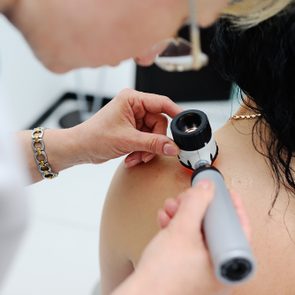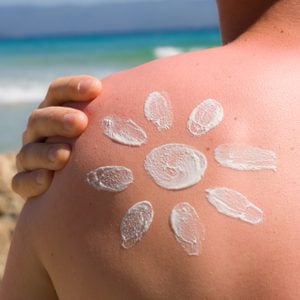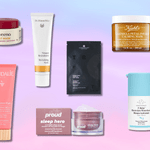If You Have Acne-Prone Skin, Read This Before You Apply Sunscreen

A dermatologist reveals the sunscreen ingredients to watch out for.
Do you know what your body’s largest organ is? Yep—it’s your skin, and you have to protect it from life’s offenders, starting with the sun. With skin cancer cases on the rise, the Canadian Cancer Society—along with most skin experts—stress the need for spreading sunscreen over all exposed areas, especially your face. But, you might be hesitant because you’re prone to acne. Well, there’s good news: You can avoid breakouts and still protect your skin.
The truth about skin sensitivity and sunscreen ingredients
Your skin most likely isn’t sensitive to the ingredients in sunscreen, according to Whitney Bowe, MD, assistant clinical professor of dermatology at the Icahn School of Medicine at Mount Sinai Medical Center in New York. “Most people think they are breaking out because of the actual active sunscreen ingredients when in fact, those ingredients rarely cause anyone to break out,” Dr. Bowe says. “When people break out from sunscreen, it’s usually a result of the other emollients, fragrances, or preservatives in the sunscreen.” Also, here’s what your skin says about your overall health.)
Sunscreen ingredients to avoid
Chemical sunscreen ingredients to avoid if you’re acne-prone include benzophenones (like oxybenzone), cinnamates, octocrylene, certain preservatives like quaternium-15, and the fragrance Balsam of Peru. These all come under the heading of chemical UV filters. This means they’re absorbed through the skin where they bond with UV light to prevent it from causing burns. This is the most common type; some studies, like a 2017 study published in the Journal of Cosmetic Dermatology, have found that certain chemical UV filters, like oxybenzone, can cause skin allergies.
A different type of sunscreen
There is another class of sunscreen that relies on the minerals zinc oxide or titanium dioxide to physically block sunlight. These are known as physical sunscreen ingredients. Rather than penetrating the skin to provide protection, these sun-blocking ingredients reflect UV rays. They’re much less likely to cause a skin reaction, but they’re also thick and more difficult to apply.
Sunscreen past its “use by” date
Another potential reason for breaking out is because you’re using sunscreen that’s past its “use by” date, says Dr. Bowe. “Sometimes the sunscreen has expired or the ingredients have gone bad,” she explains. “Or someone left the bottle in their hot car or on their beach towel, in direct sunlight.” According to Dr. Bowe, the heat and sun can break down the chemicals in the bottle rendering them ineffective and potentially irritating to the skin. She suggests keeping sunscreens out of the heat and sun, out of your hot car, and making sure to buy a new bottle every season.
So, what’s your best bet? Dr. Bowe advises scanning the label for words like “non-comedogenic,” “clear skin,” or “for acne-prone skin.” This will ensure the formulation will keep your pores unclogged.







